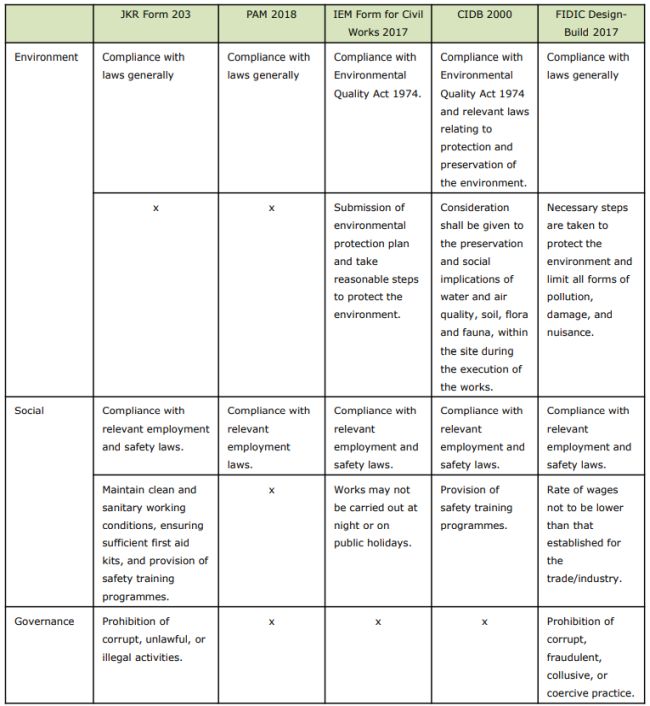Societal shifts in values have persuaded businesses to demonstrate their ESG contributions and reduce the environmental and social harm they may cause in the communities where they operate. Financial institutions are now observing ESG performance of a business as a marker of sustainability and resilience that goes beyond the balance sheet, and therefore also informs lending criteria. Similarly, ESG considerations are factored in by many investors prior to allocating their investment capital.
How does ESG impact the construction industry?
The construction industry faces regulatory, reporting, investment, and consumer pressure to clean up its ESG impact over its heavy use of resources and production of significant waste. In Malaysia, the construction industry records the employment of approximately 1.38 million people1 and is responsible for generating approximately 25,600 tonnes of construction and demolition wastes every day2. Clearly, the construction industry has a role to play in the global initiative to reduce emissions and mitigate climate crisis.
Given that the effective adherence of ESG requirements in the sector rests on the shoulders of all parties along the supply chain, it is important that they are properly incentivized to mitigate the ESG impact of their activities by appropriate contractual arrangements prior to the start of any construction project.
Are the construction standard forms in Malaysiaadequate?
The construction sector would have seen several contractual clauses relating to ESG considerations in the Malaysian and international standard forms of contract such as environmental protection, health and safety, and anti-bribery & corruption provisions. These provisions, however, vary from contract to contract.
The table below demonstrates some examples of ESG provisions contained across the various standard forms:

As observed, some of the standard forms have obligations to comply with laws and regulations, directly or indirectly pertaining to ESG matters, while some do not. However, these provisions do not seem to be sufficient as more proactive steps can be taken to strengthen ESG performance by the parties. How then can the standard forms be amplified to encourage such steps?
The "E" in ESG
The Environmental aspect is by far the greatest challenge, and most discussed change in the sector. Studies show that the construction sector is the largest consumer of natural resources, consuming 32% of global resources3, and responsible for 50% of landfill waste, 40% of drinking water pollution, and 23% of air pollution4. Employers could introduce provisions found in international standard form contracts that would incentivize the Contractor to act or encourage sustainable onsite working practices. For example:
- Climate change requirements may be incorporated into the scope of work, whereby failure to comply would amount to a "defect" under the contract5.
- The contractor could also be encouraged to suggest, when executing the works, amendments to the scope of work that are economically viable, which may result in an improvement in environmental performance, and such suggestion could then be entertained as a variation6.
- The employer can oblige the contractor to provide information regarding the environmental impact of the supply and use of materials and goods, which the contractor selects.
- The employer could withhold the issuance of the certificate of practical completion if any prescribed ESG requirementis not met.
- The parties could decide on an aggregate threshold for carbon emissions permitted for the execution of the works for a particular project, and liquidated damages may be imposed if it is exceeded.
The "S" in ESG
In order to meet the strict timeline of a construction project and for the purpose of reducing cost, contractors may not pay sufficient attention to the welfare and safety of its workers. Social considerations were often dismissed as either immaterial or a lesser priority due to the perception that they are less likely to be subjectto punitive actions or present a lower risk to revenue streams. However, issues of diversity and inclusion, modern slavery, and employee wellbeing have been coming to the forefront in recent times. Aside from general obligations to comply with labour laws, additional contractual requirements can be introduced to improve the health and welfare of workers, and the wider community. For example:
- The employer may request documentary evidence that workers are being paid at least the minimum wage and are consistent with industry standards.
- The employer may require the contractor to use its best efforts to maximise the appointment of local workers and to provide training facilities and programmes to improve their skills.
- The employer may adopt an antislavery and human trafficking policy, which the contractor would have to comply with during the execution of the works.
- Working hours for the works may be limited to prevent fatigue, as well as to ensure neighbouring communities are undisturbed by the works.
The "G" in ESG
Companies with good governance would tend to make sound decisions and retain the trust of its stakeholders, and ultimately is more likely to increase its shareholder value. In the construction sector, developers (especially in the public sector) are often scrutinized if a competitive tender process is not practiced in the procurement of the works as it could lead to unfair and/or poor selection of contractors, potentially causing reputational damage. The following are ways good governance requirements can be introduced into the contract:
- The contractor can be made to comply with data privacy, antibribery, corruption, or competition laws, as well as other similar or related code of conduct and policies that are developed by the employer.
- A tiered dispute resolution process can be introduced to ensure that disputes are escalated internally to minimize bad relations and discourage lengthy and costly litigation through early resolution of the dispute.
- The employer may introduce perioding reporting requirements to the contractor which are specific to key ESG metrics such as carbon emissions, waste generation, energy consumption,
Closing Thoughts
As employers become keen on proving their ESG credentials, contractors should expect increasing levels of ESG compliance, monitoring and reporting requirements, and the resulting increase in cost. It is worthwhile for contractors to embrace new technology and provide training to individuals for the administration of ESG matters. Particular care should also be taken in ensuring that contractual provisions adequately protect the contractors against the cost of any new regulatory requirements that are introduced during constructions.
Given the widespread acceptance of ESG, contractors should also actively monitor for any governmental grant or subsidy that may be introduced to encourage companies to adhere to ESG requirements. It is important that contract pricing by the contractors adequately reflects the cost of compliance with ESG requirements.
Footnotes
1. 'Number of people employed in the construction industry in Malaysia from 2015 to 2022' (Statista, February 2023) (https://www.statista.com/statistics/809686/annual-employment-in-the-construction-industrymalaysia/#:~:text=In%202022%2C%20approximately%201.38%20million,the%20construction%20industry%20in%20Malaysia)
2. P.X. Wong and Siti Nur Alia Roslan, 'Construction and Demolition Waste Management in Malaysian Construction Industry – Concrete Waste Management' [2019] 7(1) IUKL Research Journal 26 (https://iukl.edu.my/rmc/wp-content/uploads/sites/4/2020/12/3.-ST_P.X.Wong_.pdf)
3. 'Sustaining the built environment' (CIOB, 5 June 2018) (https://www.ciob.org/blog/sustaining-built-environment)
4. Karolina Dobrowolska, 'How Does Construction Affect the Environment' (ArchDesk, 4 March 2021) (https://archdesk.com/blog/how-doesconstruction-affect-the-environment/)
5. Observed in the secondary option clause X29 of the NEC4 suite of contracts
6. Observed in supplemental provision 8 of the JCT Design and Build Contract 2016
The content of this article is intended to provide a general guide to the subject matter. Specialist advice should be sought about your specific circumstances.

